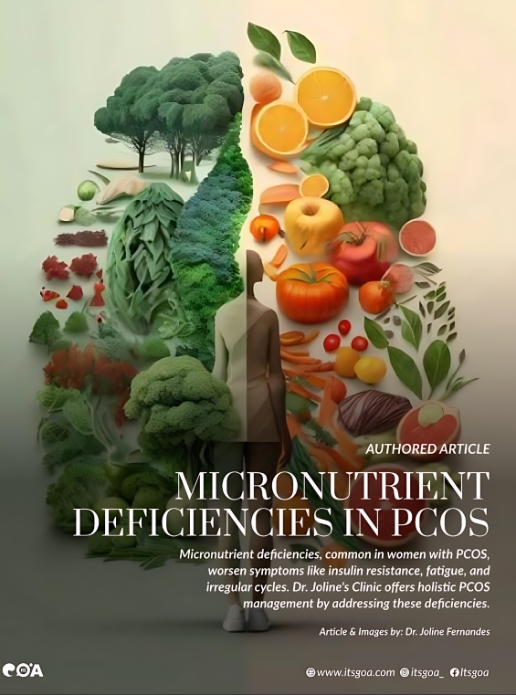Micronutrient Deficiencies In PCOS
Polycystic Ovary Syndrome (PCOS) affects millions of women worldwide and is characterised by hormonal imbalances, irregular periods, and ovarian cysts. While the exact cause of PCOS is not fully understood, research suggests that micronutrient deficiencies may play a role in the development and progression of the condition. At Dr. Joline's Clinic, we prioritise a holistic approach to PCOS management, including addressing any underlying nutrient deficiencies that may be contributing to our patient's symptoms.
The Importance of Micronutrients
Micronutrients are essential nutrients that our bodies need in small amounts to function properly. They play a crucial role in various processes, such as metabolism, hormone regulation, and immune function. In women with PCOS, several micronutrients are often found to be deficient, which can worsen the symptoms of the condition.
Common Micronutrient Deficiencies in PCOS
- Vitamin D: Research indicates a high prevalence of Vitamin D deficiency in women with PCOS. Low vitamin D levels are associated with insulin resistance, impaired glucose metabolism, and increased risk of cardiovascular disease.
- Magnesium: Magnesium deficiency is common in individuals with insulin resistance, a hallmark feature of PCOS. Magnesium is crucial in glucose metabolism, insulin sensitivity, and muscle function
- Zinc: Zinc deficiency is linked to impaired ovarian function and irregular menstrual cycles in women with PCOS. Zinc is essential for hormone regulation, immune function, and reproductive health.
- Omega-3 Fatty Acids: Omega-3 fatty acid deficiency is associated with inflammation and dyslipidemia, common features of PCOS. Adequate intake of Omega-3 fatty acids is crucial for reducing inflammation and supporting cardiovascular health.
- Iron: Iron deficiency is associated with irregularities in the menstrual flow such as prolonged periods and heavy bleeding during periods. Prolonged heavy bleeding is not merely inconvenient. It can lead to chronic fatigue from iron-deficient anaemia. It is not uncommon for women with PCOS to present with excessive blood loss from an episode of heavy and prolonged bleeding that blood transfusion may be necessary
Signs and Symptoms of Micronutrient Deficiencies:
Fatigue and Weakness: Low levels of vitamin D, magnesium, Iron, and zinc can contribute to fatigue, weakness, and reduced energy levels.
Irregular Menstrual Cycles: Micronutrient deficiencies, particularly zinc, can disrupt ovarian function, leading to irregular menstrual cycles and fertility issues.
Hair Loss: Zinc and iron deficiencies may contribute to hair loss or thinning, a common concern for women with PCOS.
Insulin Resistance: Magnesium deficiency is associated with insulin resistance, a key feature of PCOS characterized by elevated blood sugar levels.
Inflammation: Omega-3 fatty acid deficiency can exacerbate inflammation, leading to increased levels of inflammatory markers and contributing to PCOS symptoms.
How to Address Micronutrient Deficiencies
To address these deficiencies, it's important to focus on a balanced diet that includes nutrient-rich foods. Some examples include:
- Vitamin D: Include sources of vitamin D in your diet such as fatty fish (salmon, mackerel), fortified dairy products, eggs, and mushrooms exposed to sunlight.
- Magnesium: Incorporate magnesium-rich foods such as leafy green vegetables (spinach, kale), nuts and seeds (almonds, pumpkin seeds), legumes, and whole grains.
- Zinc: Consume zinc-containing foods such as shellfish (oysters, crab), red meat, poultry, nuts and seeds (pumpkin seeds, cashews), and legumes (chickpeas, lentils).
- Omega-3 Fatty Acids: Increase your intake of omega-3 fatty acids by consuming fatty fish (salmon, sardines), flaxseeds, chia seeds, walnuts, and eggs.
- Iron: Include dark green leafy vegetables, garden cress seeds, chia seeds, pumpkin seeds, and dry fruits like dates, black raisins, and prunes, In some cases, supplements may be recommended by a healthcare provider to address specific deficiencies. It's important to consult with a healthcare professional before starting any supplementation plan.
Micronutrient deficiencies are common in women with PCOS and can contribute to the development and progression of the condition. At Dr. Joline's Clinic, we are committed to providing comprehensive care that addresses not only the symptoms of PCOS but also any underlying nutrient deficiencies. Through personalised nutrition plans, lifestyle modifications, and careful monitoring, we strive to improve our patients' overall health and well-being while effectively managing their PCOS symptoms.
At Dr. Joline's Clinic, we understand the complexities of PCOS and the importance of addressing micronutrient deficiencies. Our holistic approach is designed to provide you with comprehensive care and support.
Schedule your consultation today at Dr. Joline's Clinic. Take the first step towards improved health and well-being.
